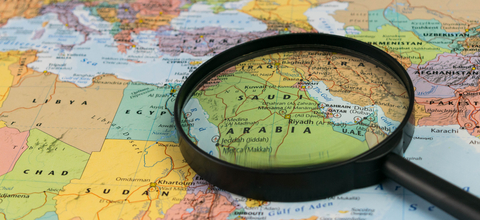
Whatever his frustrations, President Joe Biden scored a modest win during his recent trip to Saudi Arabia to attend a meeting of local Arab kingdoms and emirates. He avoided getting sucked again into the Mideast morass as a protector of its royal autocrats.
Critics say all he got from Saudi Crown Prince Mohammed Bin Salman (known as MBS) was a fist bump that several political pundits in Washington are mocking.
But these are early days in Biden’s nascent attempt to navigate a changed Gulf region where the de facto leaders, Saudi Arabia and the United Arab Emirates (UAE), have decided to loosen Washington’s decades-long grip on their foreign and trade policies. They also want to reduce their heavy dependence on US weapons and military advice to protect their absolute monarchies.
To diversify away from Washington’s rules about human rights when using American weapons, they are turning cautiously towards Beijing and Moscow for markets and to buy weapons.
They are using their deep pockets to build dynamic modern economies with financial infrastructures that are more international. At the same time, they are building cultural influence in Washington by buying their way to locating in their territories the best US and European museums, art galleries, educational institutions, entertainment complexes, and sports events like golf tournaments and football championships.
Very prudently, they are repairing centuries-old relationships with Iran (Persia) to reduce tensions exacerbated by Israel’s and America’s very hostile attitudes towards Tehran. At the same time, they are improving relations with Israel to reduce regional tensions and gradually accept the country as a local power.
Overall, there is lesser warmth towards Washington’s politics and world view. Against this backdrop, Biden attended the Gulf Cooperation Council (GCC) plus 3 Summit in Jeddah. The GCC is a political and economic alliance of Saudi Arabia, Kuwait, UAE, Qatar, Bahrain, and Oman. The plus 3 were Egypt, Jordan, Turkey.
The Summit was not a venue for pleading for more oil and gas. The “fist bump” meeting with MBS was mostly ceremonial but a big gain for the Prince because he was able to demonstrate to the entire region that Biden no long wants to turn him into a pariah.
He did not need to given Biden anything in return because Biden could not have met all the leaders at the GCC + 3 summit without meeting the host country’s leader. However, the Prince could rehabilitate himself further by helping to reduce gasoline prices in the US and around the world in coming weeks and month.
Biden’s critics may remember the trip only for the fist bump with a Prince who, according to US intelligence assessments, bears final responsibility for the killing and dismembering of journalist Jamal Khashoggi inside the Saudi consulate in Istanbul, Turkey. This is a political hit against Biden in domestic American politics and the future will tell whether the first bump was worth it.
But his GCC + 3 interlocutors drew a lot of satisfaction from Biden’s pledges at the Summit, provided that his administration and his successors follow up on them.
“For the first time since 9/11, an American President is visiting this region without American troops being engaged in a combat mission in the region,” he said. This was reassuring. None of those governments want to see American boots on the ground because their presence is too ruinous for local culture, lifestyles and religious norms.
“We will not walk away and leave a vacuum to be filled by China, Russia, or Iran,” he added. This was reassuring because the last thing that anyone wants is that their region turns into ground zero for proxy wars by Russia, China and Iran against the US and its friends. Iraq, whose prime minister met Biden ahead of the Summit, is strongly against more US wars on its territory against Iran-backed militias or jihadi terrorists.
Biden’s assertions were welcomed that the US will not allow foreign or regional powers to jeopardize freedom of navigation through Middle East waterways, including the Strait of Hormuz and the Bab al-Mandab. Nor will the US tolerate efforts by any country to dominate another in the region through military buildups, incursions, and threats.
“But no matter what, the United States is committed to ensuring that Iran never gets a nuclear weapon,” Biden pledged. The US is also integrating air defenses and early warning systems to ensure that the Gulf regimes working together can defeat airborne threats.
It is true that these were restatements of previous US positions. But the region’s leaders needed to hear them from Biden himself because this was his first visit and he has shown little interest in their region so far.
Those words needed to be said against the backdrop of Russia’s brutal and unprovoked war against neighboring Ukraine, China’s increasingly coercive actions in the Indo-Pacific and beyond, and Iran’s increasing capacity to build a usable nuclear weapon in a short time.
Photo 106515285 © wael alreweie | Dreamstime.com
















